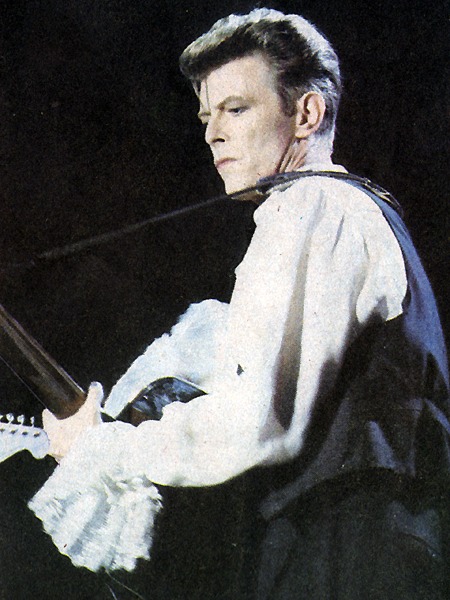Mick Ronson, a name often mentioned in the shadows of rock legends, deserves a spotlight of his own. Known primarily for his collaboration with David Bowie, Ronson was more than just a guitarist for The Spiders from Mars. His influence on rock music, particularly in the 1970s, was profound, yet it remains underappreciated by many.
In this article, we delve into the life and career of Mick Ronson, exploring how his musical genius helped shape the sound and style of rock music. From his early beginnings to his pivotal role alongside Bowie and beyond, we aim to uncover the underrated legacy of this influential musician.
Early Life and Musical Beginnings
Mick Ronson’s journey into the world of music began in the working-class town of Hull, England, where he was born on May 26, 1946. Growing up in a modest environment, Ronson’s early exposure to music came from his family, particularly his mother, who played piano. This humble beginning was the foundation of what would become a remarkable career in rock music.
From a young age, Ronson showed a keen interest in music, initially learning the piano before gravitating towards the guitar. His passion for the instrument was evident, and by his teenage years, he was already making a name for himself in the local music scene. This period was crucial in developing his distinctive style; Ronson was not just playing the popular tunes of the day but was experimenting and honing his skills, influenced by a mix of genres from rock ‘n’ roll to classical music.
In the early 1960s, Ronson began his professional career, playing with various bands around Hull. His early gigs ranged from local clubs to dance halls, where he started to understand the dynamics of performing live and working with other musicians. This phase was instrumental in Ronson’s growth as a guitarist and a performer. He was not only improving his technical skills but also learning the art of stage presence and audience engagement.
Ronson’s early influences were diverse, ranging from the rock and roll of Elvis Presley and Chuck Berry to the more experimental sounds of Jeff Beck and Les Paul. These influences were evident in his playing style, which began to showcase a blend of technical prowess and creative expression. His ability to infuse rock music with a hint of blues and jazz nuances set him apart from his contemporaries.
Despite his growing reputation as a talented guitarist, Ronson’s early career was marked by a constant search for the right opportunity to showcase his abilities on a larger stage. This period of his life, though less known, laid the groundwork for his future successes. It was a time of learning, experimenting, and preparing for the opportunities that the future would bring.
In these formative years, Ronson’s dedication and talent were clear, but the recognition he deserved was still a distant dream. Little did he know that his big break was just around the corner, ready to launch him into the annals of rock history.
The Ziggy Stardust Era: Collaborations with David Bowie
Mick Ronson’s career took a monumental turn in 1970 when he joined David Bowie’s band. This collaboration would become one of the most significant chapters in his career. Ronson met Bowie through their mutual manager, Tony Defries, and they quickly discovered a strong musical synergy. Ronson’s guitar skills and his ability to arrange music complemented Bowie’s visionary songwriting and performance style.
Crafting the Sound of ‘The Rise and Fall of Ziggy Stardust and the Spiders from Mars’
Arguably, the most iconic work of this collaboration was the creation of the album “The Rise and Fall of Ziggy Stardust and the Spiders from Mars” in 1972. Ronson’s contribution to this album was invaluable. He was not just the lead guitarist but also took on the role of an arranger, shaping the sound that would define an era of glam rock. His arrangements on tracks like “Moonage Daydream” and “Ziggy Stardust” are considered some of the best in rock music.
The Dynamic Duo on Stage
Ronson’s impact was not limited to the recording studio. On stage, he was a vital part of the Ziggy Stardust persona. His flamboyant playing style and stage presence complemented Bowie’s theatrical performances, creating a captivating show for the audience. The duo’s chemistry was palpable, with Ronson’s guitar solos becoming a highlight of their live performances.
Beyond ‘Ziggy Stardust’
The collaboration between Bowie and Ronson continued beyond the “Ziggy Stardust” album. They worked together on several other projects, including the albums “Hunky Dory,” “Aladdin Sane,” and “Pin Ups.” Each of these albums had Ronson’s imprint, showcasing his versatility as a guitarist and an arranger. His ability to adapt to and enhance Bowie’s evolving musical style kept their collaboration fresh and influential.
End of an Era
Despite the success and groundbreaking nature of their work, Ronson’s partnership with Bowie came to an end in 1973. The reasons for their split were complex, involving both artistic differences and management issues. However, the legacy of their collaboration remained. The era of Ziggy Stardust not only elevated Bowie’s career to new heights but also showcased Mick Ronson’s immense talent to the world.
This period in Ronson’s career, though brief, was intensely creative and influential. It demonstrated his ability to not only play guitar at an extraordinary level but also to think beyond the instrument, contributing to the creation of a sound and style that would leave a lasting impact on the rock music scene.
Solo Career and Other Collaborations
After his collaboration with David Bowie, Mick Ronson embarked on a solo career, seeking to establish himself as more than just a sidekick to a rock legend. His first solo album, “Slaughter on 10th Avenue” (1974), showcased his skills not only as a guitarist but also as a composer and producer. The album, featuring a mix of instrumental tracks and songs, highlighted Ronson’s diverse musical abilities and his flair for blending different genres. However, despite its artistic merit, the album did not achieve significant commercial success, a theme that would unfortunately recur throughout his solo endeavors.
Collaborating with Other Artists
Ronson’s post-Bowie era was marked by numerous collaborations with a variety of artists, showcasing his versatility and talent as a musician and producer. He worked with Ian Hunter, former lead singer of Mott the Hoople, on several albums, including the critically acclaimed “Ian Hunter” (1975). His ability to adapt to different styles and enhance the work of other artists was evident in these collaborations. Ronson’s contribution to Lou Reed’s live album “Rock ‘n’ Roll Animal” (1974) is another notable example, where his guitar work received widespread acclaim.
Production and Arrangement Contributions
Beyond performing, Ronson also made significant contributions as a producer and arranger for various artists. He worked on John Mellencamp’s album “Chestnut Street Incident” (1976) and played a crucial role in shaping the sound of that record. His expertise in arrangement and production was highly sought after, and he continued to work behind the scenes, contributing to the success of many albums throughout the 1970s and 1980s.
Challenges and Recognition
Despite his immense talent and contributions to the music industry, Ronson’s solo career and collaborative projects often remained in the shadow of his work with Bowie. He faced challenges in gaining recognition as a solo artist, partly due to the overwhelming association with Bowie’s success. However, among musicians and discerning music fans, Ronson was highly respected for his musicality and creativity.
A Diverse Musical Journey
Ronson’s journey beyond Bowie was a testament to his versatility as a musician. He moved seamlessly between roles as a guitarist, composer, arranger, and producer, leaving his mark on a diverse range of musical projects. While he may not have achieved the same level of fame as some of his contemporaries, his influence and contributions to the music world were significant.
Throughout his post-Bowie career, Mick Ronson continued to demonstrate his unique genius in the music industry. His work during this period, though underrated, is a vital part of his legacy, showcasing a musician who was much more than just a glam rock guitarist.
Innovations and Musical Style
Pioneering Guitar Techniques
Mick Ronson’s impact on rock music was largely due to his innovative guitar techniques. He was known for his ability to blend raw power with intricate arrangements, creating a sound that was both aggressive and melodic. Ronson often employed a mix of heavy riffing and fluid solos, a style that became a hallmark of glam rock guitar. His use of feedback and sustain, along with a keen sense of timing and dynamics, set new standards for rock guitarists.
Arrangement and Production Skills
Beyond his prowess as a guitarist, Ronson’s talent in arrangement and production played a critical role in his innovative contributions to music. He had a unique ability to take a song and elevate it through his arrangements, often adding orchestral elements that blended seamlessly with rock music. This approach was groundbreaking at the time and influenced the development of a more theatrical and expansive sound in rock.
Influencing the Sound of Glam Rock
Ronson was instrumental in shaping the sound of glam rock, a genre characterized by its flamboyant style and theatrical performances. His guitar work, marked by its distinct tone and style, became a defining feature of this genre. Ronson’s influence extended beyond guitar playing; his sense of fashion and stage presence also contributed to the visual aspect of glam rock.
Blending of Genres
One of Ronson’s notable achievements was his ability to blend different musical genres. He incorporated elements of classical music, blues, and jazz into his rock guitar playing, creating a rich and diverse sound palette. This fusion of genres was not only innovative but also helped in broadening the appeal of rock music to a wider audience.
Legacy as a Guitarist and Musician
Ronson’s innovations and musical style had a lasting impact on the world of rock music. He inspired a generation of guitarists and musicians with his unique approach to playing and arranging. Even today, his influence can be heard in the work of many contemporary rock artists. Ronson’s legacy as a guitarist and musician is marked by his creative vision and his willingness to experiment and push the boundaries of conventional rock music.
Why Was He Underrated?
Overshadowed by Collaborations
Despite his immense talent and contributions to the rock music genre, Mick Ronson is often remembered primarily for his association with David Bowie. While this collaboration was undeniably influential, it somewhat overshadowed Ronson’s individual achievements and contributions. This phenomenon is not uncommon in the music industry, where talented musicians working alongside more prominent figures sometimes do not receive the recognition they deserve.
Underappreciated Talent
Ronson’s skills as a guitarist, arranger, and producer were exceptional, yet they were not always fully acknowledged during his lifetime. His ability to fuse different musical styles and create innovative sounds was groundbreaking, but it didn’t always translate into commercial success or widespread acclaim. This underappreciation might be attributed to the era’s focus on frontmen and lead singers, with instrumentalists often relegated to the background.
Posthumous Recognition
Over the years, however, there has been a growing recognition of Ronson’s contributions to rock music. Music historians and critics have begun to highlight his role in shaping the sound of the 1970s and influencing subsequent generations of musicians. This posthumous recognition, while well-deserved, underscores the extent to which his genius was under appreciated during his career.
Influence on Future Generations
Ronson’s influence extends far beyond his collaborations and solo work. He inspired a wave of guitarists and musicians who admired his innovative techniques and musicality. His style and approach to music production have been studied and emulated by many in the industry, demonstrating his lasting impact on the genre.
A True Musician’s Musician
Among his peers, Ronson was always highly respected. Known as a musician’s musician, he was someone deeply admired by those who understood the nuances of his craft. His dedication to his art, his versatility, and his willingness to push creative boundaries made him a true icon in the eyes of many fellow artists.
Conclusion
Mick Ronson was a key figure in the rock music scene whose talents extended far beyond his famous collaboration with David Bowie. As a guitarist, arranger, and producer, he brought innovation and flair to the music he worked on. Despite not receiving widespread recognition during his lifetime, Ronson’s influence on the genre and on future musicians is undeniable. His story is a reminder of the many talented individuals in the music industry who contribute significantly but often remain in the background. Ronson’s legacy in rock music is rich and enduring, and it’s important to acknowledge and celebrate his contributions to the field.




